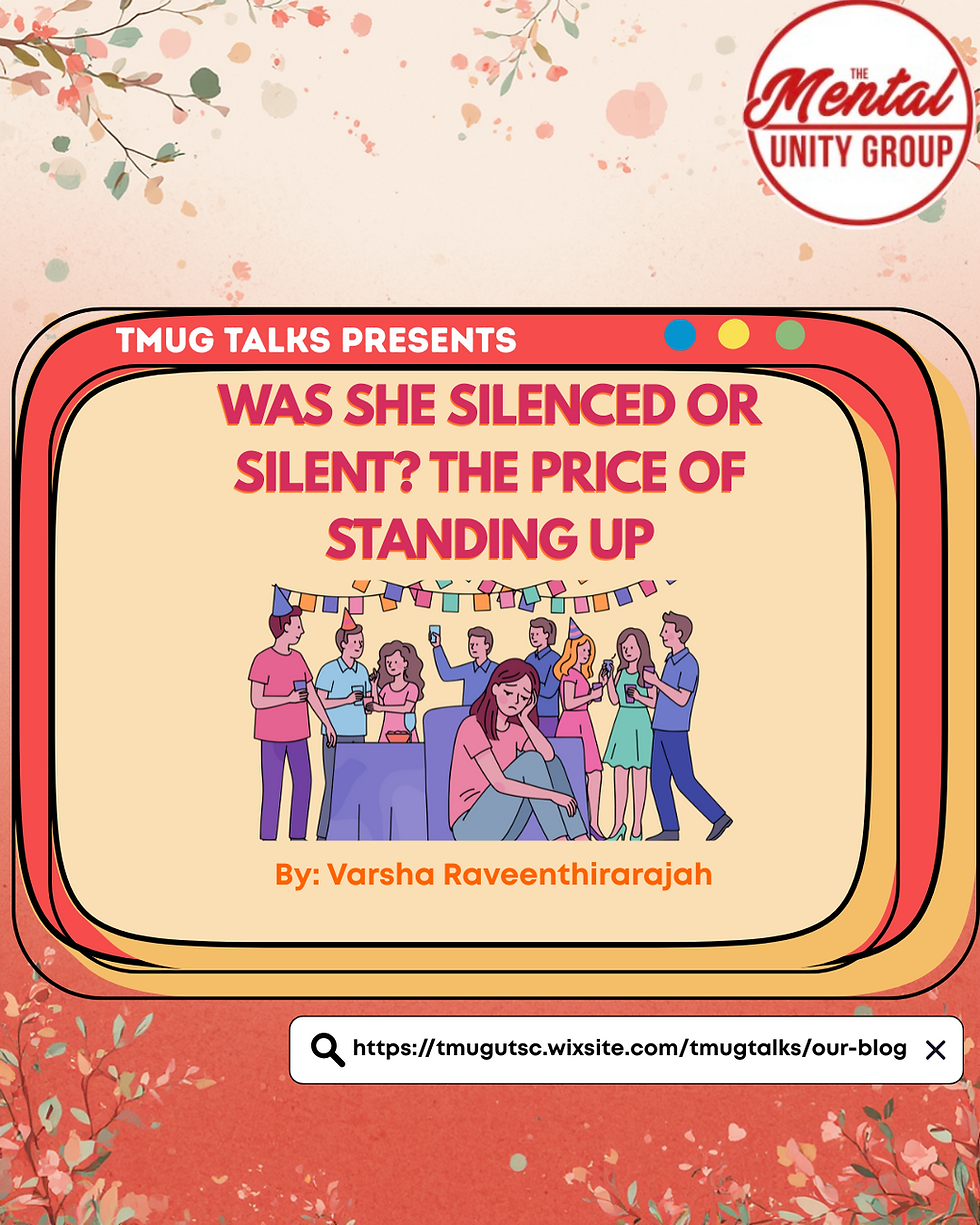Our Neighbourhoods Are Not Safe?
- Lakshana Varathalingam
- Jul 26, 2021
- 3 min read

As a trigger warning, this article will be on addressing a couple of super sensitive topics related to human trafficking.
Every year, July 30th is used to raise awareness about the dangers of human trafficking. Human trafficking has existed for centuries, yet more than 500,000 women, children and men are being trafficked each year. It was a prevalent issue in the 1800s, and remains to be today. Just last month, a six-month human trafficking investigation in the Waterloo region ended, where three local residents were arrested (Gdavischex, 2021). I would like to reiterate that local residents were involved in a multi-billion dollar industry that captures individuals for sexual exploitation. These criminals were someone’s neighbour, employee or even friend. They had access to public parks, malls, schools and so forth. Neighbourhoods are becoming unsafe, because of exploitative industry. Young children are being harassed, forced into marriages and murdered for their organs. Various victims are trafficked across borders, and sent to other countries, such as America and India. I don’t think I need to go into further details about how dangerous this is for our children, young teenagers and citizens in general. Change needs to start today. We need to be questioning how this industry remains standing when ample amounts of international and Canadian laws are against it. By keeping ourselves educated, we can help fight for better protection together.
In 2020, Statistics Canada stated that 90% of the victims are females between ages of 18-24, and some are as young as 13 (Lopez-Martinez, 2020). You may be reluctant to accept that it is happening in Canada, however 93% of the victims are Canadian citizens! To really put things in perspective, major cities in Peel Region have a rate of 1.14 victims per 100,000 people. Those cities are Brampton, Mississauga and Caledon. It is more prevalent in areas that are popular for tourists, such as Toronto (Lopez-Martinez, 2020). Many of the victims are being exploited by large human trafficking rings of people they trust, such as boyfriends.
One way to help is supporting anti-human trafficking services that bring awareness by through various nationwide campaigns. One of the largest agency dedicated towards serving trafficked youths, Covenant House Toronto, partnered with the Toronto Police Service’s Human Trafficking Unit to develop The Shoppable Girls (Goodfield, 2020). The Shoppable Girls campaign has been teaching the girls and caregivers on the signs of luring, grooming and exploitation (2020). All of their research is collected from trafficked survivors and teenage girls. This campaign was launched last year, where real-life girls were standing in storefront as mannequins on Toronto's Queen Street West. These live models were used expose the real horror that girls are merely just priced products to sex traffickers (Goodfield, 2020).
Although The Shoppable Girls was an incredibly dark campaign approach, I truly believe it was necessary. I say that because it inspired me to write this blog post to help them spread the message. If someone was offended by it, they should be because it is often the things that startle us that we must be aware of the most. Now, just like I have, it is important to consider that resentment as inspiration to do better. We need to be talking about this. Everyone needs to be. Schools should be informing their students of the dangers of trafficking and teach them about warning signs. Parents should be having uncomfortable conversations about how important it is to protect yourself with their kids. There is no better way to learn about the reality of a dark realities of sex trafficking, than purely just stating facts.
Change can start today by making small changes. You can help by teaching the dangers of trafficking to our younger generation, in order to reduce future cases. Currently, social media has been embedded into our modern culture. It has unsettlingly given predators a way more accessible platform to seek out vulnerable teens. It is advised for parents to have strict rules in terms of age-restricting some applications or use parental control. Like stated before, it is important to have conversations about this sensitive topic. Kids deserve the right to know how to protect them if ever in harm's way. As a collective, if we all do our part in keeping everyone informed, we can both prevent and identify dangerous situations.
Sources:
Gdavischex, G. D. (2021, June 11). 3 from Waterloo Region arrested following human trafficking investigation: Peterborough police. Global News. https://globalnews.ca/news/7942028/arrests-human-trafficking-investigation-peterborou gh-police/.
Goodfield, K. (2020, February 21). Girls stand behind Toronto storefront windows to draw attention to harsh realities of sex trafficking. Toronto. https://toronto.ctvnews.ca/girls-stand-behind-toronto-storefront-windows-to-draw-atten t ion-to-harsh-realities-of-sex-trafficking-1.4820025.
Lopez-Martinez, M. (2020, February 20). Sex trafficking still a prevalent issue across Canada, advocates and police say. CTVNews. https://www.ctvnews.ca/canada/sex-trafficking-still-a-prevalent-issue-across-canada-ad vocates-and-police-say-1.4820944.
Shoppable Girls campaign. Covenant House Toronto. (2020, March 27). https://covenanthousetoronto.ca/shoppablegirls/.
United Nations. (n.d.). World Day Against Trafficking in Persons. United Nations. https://www.un.org/en/observances/end-human-trafficking-day.





Comments